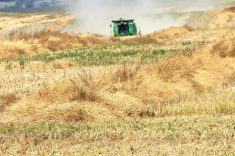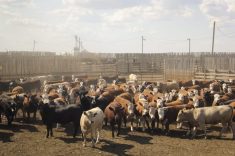Updated, July 15 — The federal government has announced a pilot program that will make it easier for farms and food companies to maintain workers they recruit from around the world.
Ahmed Hussen, minister for immigration, refugees and citizenship, announced the program Friday at Maple Leaf Foods in Mississauga.
Why it matters: There’s a labour gap of 59,000 jobs in agriculture that’s expected to grow to 114,000 in 10 years, according to the Canadian Agricultural Human Resources Council. This policy could help alleviate the labour challenge, especially in some of the tightest labour market areas, such as livestock farms and meat processing.
Read Also

U.S. livestock: Feeder cattle hit contract highs on tight supply
Chicago | Reuters – All Chicago Mercantile Exchange feeder cattle futures and most live cattle futures hit contract highs on…
The program, called the Agri-Food Immigration Pilot Project, will allow temporary foreign workers to apply for permanent residency after a year of employment in Canada in the past three years.
Currently, lower-skilled agriculture workers have rarely been able to immigrate as the federal focus has been on higher-skilled workers. However, it is the people who fall into the lower skill category who are needed.
Currently, temporary foreign workers get two-year work visas, then must go back to their country of origin. The employer can then reapply to the Temporary Foreign Worker program to bring them back for another round of work. Only Manitoba’s provincial immigration program offers good access for farm and food workers currently.
The program applies to year-round, full time occupations such as greenhouse, mushroom, livestock and meat processing. It will not apply to the seasonal agriculture worker program.
The pilot program, which will allow 2,750 applications per year, to a total of 16,500 people over the length of the project, to apply to for permanent residency, with the goal of eventual Canadian citizenship.
Details on how workers may apply for permanent residence through the pilot are expected to be available in early 2020, the government said Friday.
Employers who invest in bringing workers to Canada and then training them have only a two-year window to have the employee work for them, although they often do return for a new work term. The new policy will allow them to build a longer relationship with the employee.
“This program demonstrates how we in Canada can build on our world-class immigration system to address labour market needs,” said Hussen in announcing the project. We listened to a particular sector that needs skilled workers.”
Rodger Cuzner, the parliamentary secretary to the minister of employment, workforce development and labour, and a Cape Breton MP, has been working on the file for six years and Hussen said he deserves credit for the policy.
“This is a whole bunch of people coming together to make this policy a reality,” Cuzner said in remarks at the announcement.
Rory McAlpine, senior vice-president, government and industry relations, with Maple Leaf Foods has been working on the file for seven years.
Meat processing companies face especially acute challenges in attracting workers and have relied on the temporary foreign worker program for years.
“This is extremely welcomed by the industry,” said Marie-France MacKinnon, vice-president of public affairs and communications at the Canadian Meat Council. “Today we celebrate what happens when we work together and collaborate.”
“Mushroom growers and our workers feel we finally have a seat at the Canadian immigration table,” Ryan Koeslag, executive vice-president for the Canadian Mushroom Growers Association, said Friday in a separate release. “We can finally say agriculture is officially part of Canada’s immigration plan.”
The program covers all skill levels, including those that are deemed lower-skilled agriculture and food sectors:
- harvesting labourer for year-round mushroom production and greenhouse crop production
- general farm worker for year-round mushroom production, greenhouse crop production, or livestock raising
- farm supervisor and specialized livestock worker for meat processing, year-round mushroom production, greenhouse crop production or livestock raising
- meat processing
- retail butcher
- industrial butcher
- food processing labourer
The changes:
Temporary foreign workers who have been employed in Canada in agriculture and agri-food for 12 months in the past three years will be able to apply for Canadian permanent residency starting in early 2020.
Employers in the agri-food sector who intend to be part of the pilot will be eligible for a two-year labour market impact assessment.
— John Greig is the editor of Farmtario. Follow him at @jgreig on Twitter.

















